35+ Times Internet Sleuths Helped Their Fellow Users Identify Their Vintage Finds
Imagine stumbling upon something old, dusty, and mysterious. Your curiosity is piqued, and you can’t wait to uncover its secrets. But what if you had no clue what you were looking at? That’s the dilemma countless people have faced when stumbling upon ancient artifacts or relics.
From the depths of forgotten tombs to the dusty corners of antique shops, these treasures can be both fascinating and perplexing. Some might recognize them as priceless artifacts, while others might mistake them for glorified paperweights.
But fear not, for ignorance is not always bliss. With the help of experts and a little bit of research, even the most clueless among us can unlock the secrets of these ancient wonders. So the next time you stumble upon something old and mysterious, don’t just brush it off as junk. It could be the discovery of a lifetime, waiting to be uncovered.
All images and identifications are courtesy of the Reddit community r/WhatIsThisThing.
Dragon Torch Holder
Metal detecting can be a thrilling hobby, especially when find something you’ve never seen before. That’s exactly what happened to one lucky person in New Hampshire who stumbled upon a small but heavy metal object. After a bit of head-scratching and research, they discovered that it was a dragon torch holder.
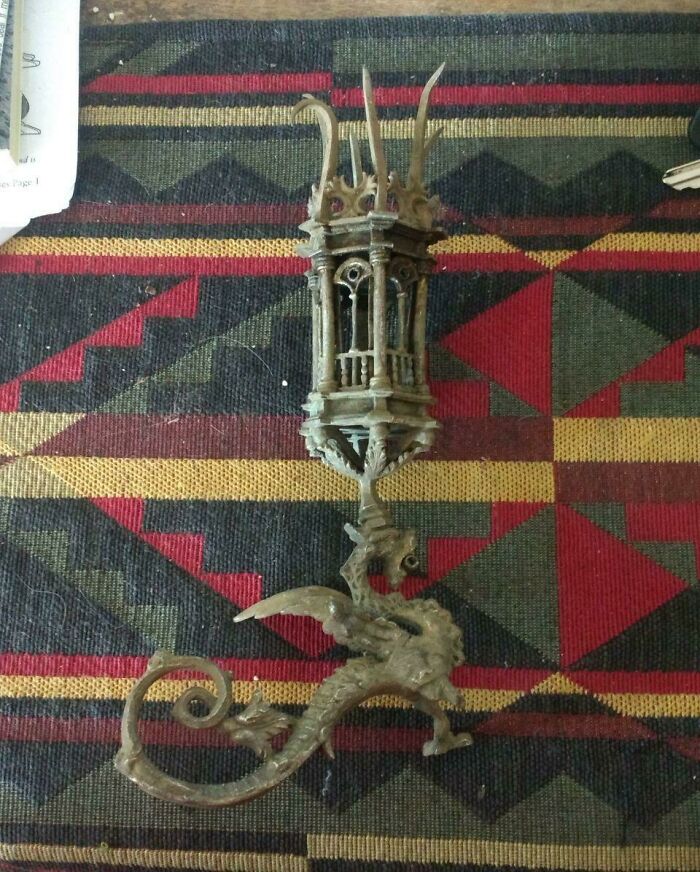
Dragon torch holders were once common fixtures in homes, particularly in the late 19th and early 20th centuries. The name speaks for itself. The holder would be mounted on a wall, and the torch (aka candle) would be placed in the dragon’s mouth, providing a source of light.
An Astrolabe
One lucky user came upon this odd object at a used book store. At first glance, the device seemed to have something to do with mapping. All of its parts rotated, and there were markings for different months. They weren’t entirely wrong.
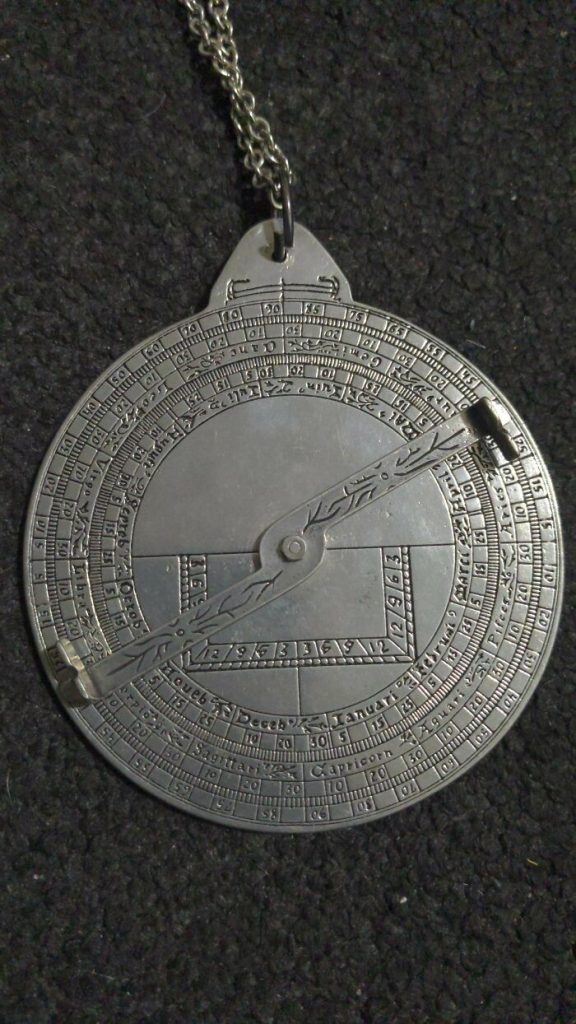
Think of an astrolabe as the GPS of the ancient world. They were used to determine the position of celestial objects, like the sun and stars, in the sky. Using that information, the user could calculate their position on Earth.
Brass Man or Tobacco Paraphernalia?
One user discovered what they thought was a sculpture of a brass man. The head of the man came off, and the backpack opened, leading the user to believe it was some kind of art piece. After some research, they learned it actually has a function.
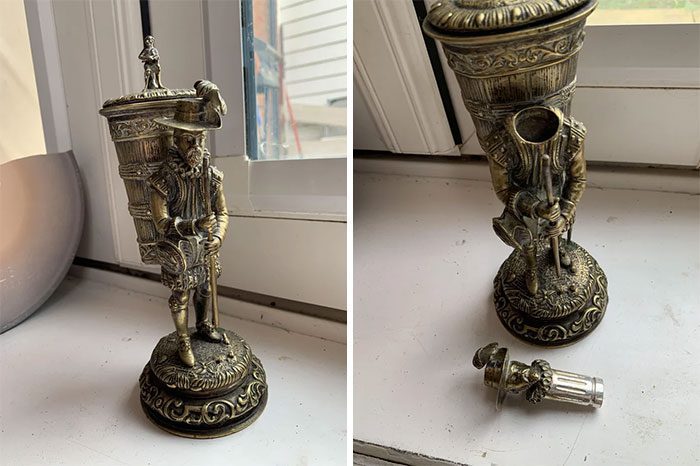
It’s a piece of tobacco paraphernalia. The backpack was designed to hold tobacco leaves. This unusual design isn’t entirely surprising. Tobacco has long been associated with luxury and sophistication, and it’s not uncommon for products to be marketed with this in mind.
Tool To Remove Top of Soft-Boiled Eggs
Sometimes the most mundane objects can hold the most interesting stories. For one user, the discovery of a strange tool under the floorboards of an 1800s-era house turned out to be a fascinating glimpse into the past. At first, the user had no idea what the object was or what it could have been used for.
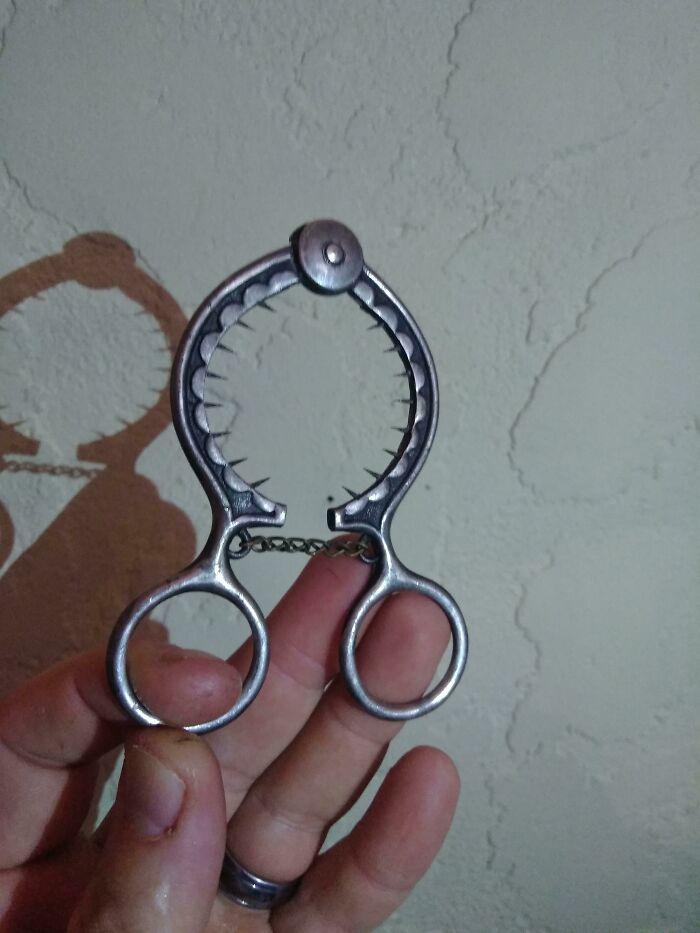
Turns out that it was actually an egg topper—a tool used to remove the top of soft-boiled eggs. Soft-boiled eggs were a common breakfast food at the time, and having a tool like this would have made the process of eating them all the more enjoyable.
Treasure Underwater
Oh, the things we find in the water! From sunken treasures to creepy sea monsters, the ocean is full of surprises. But for one lucky friend, the discovery was something far more interesting than your average shipwreck or giant squid. It was a figure of the Santerian Orisha Olokun!
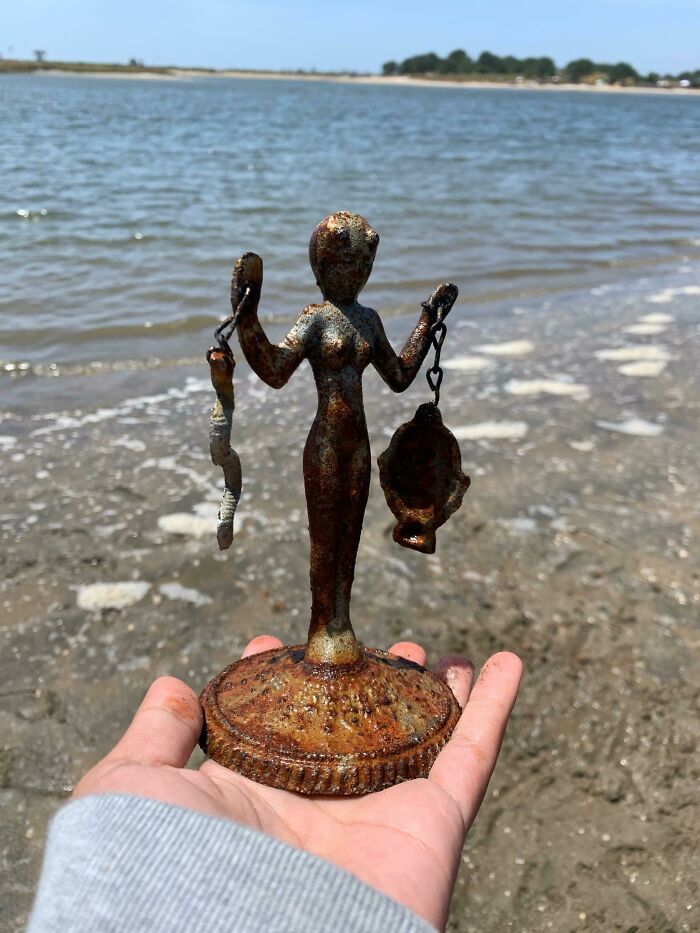
So, what the heck is it? Well, in the Santerian religion, Olokun is basically the boss of the ocean. This mighty deity is said to hold all kinds of secrets, which is probably why people have been so fascinated by him for centuries.
From The Time of Vikings
When you think of Vikings, you might picture fierce warriors sailing the seas and conquering new lands. While that is true, they also had a great sense of style. One lucky owner was gifted half of a Viking chair by a friend, and it’s a real masterpiece.
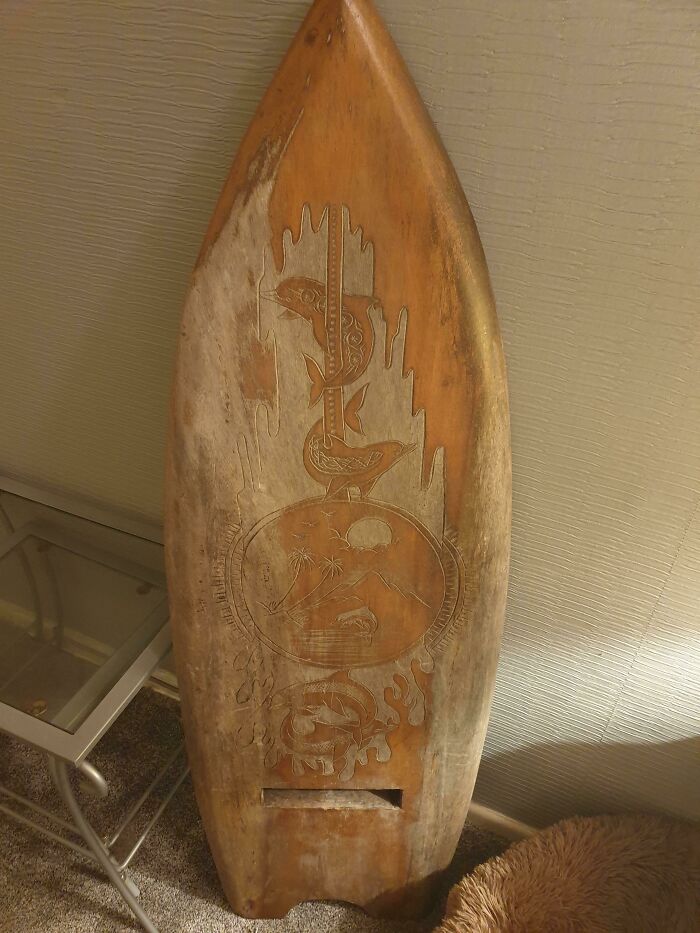
While the age is uncertain, it’s clear that this piece has been around for a while. Of course, the best part of the chair is how it looks. With its intricately carved details and sturdy design, it’s a great statement piece, to say the least.
Ferrotype Photograph
While metal detecting isn’t always fruitful, hobbyists sometimes uncover something that’s been hidden away for years. But what happens when that something turns out to be a mysterious photograph? That’s exactly what happened to one lucky detectorist who stumbled upon a metal object outside of an old church.
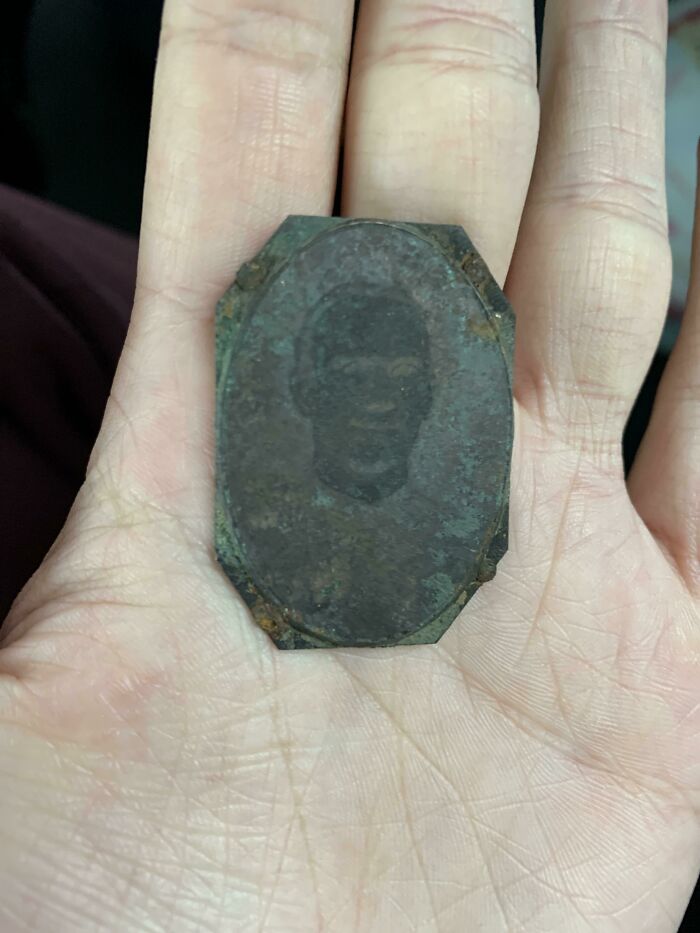
Upon closer inspection, the object turned out to be a Ferrotype photograph—a type of image that was popular in the mid-1800s. With its distinctive appearance and unique properties, the Ferrotype was a favorite among photographers of the time, and it’s no surprise that one ended up buried outside of an old church.
A Goodwill Find
As they say, one person’s trash is another person’s treasure. Or, in this case, one person’s Goodwill finds another person’s vintage whale oil lamp! It’s amazing what kind of gems you can unearth when you’re on the hunt for hidden treasures.
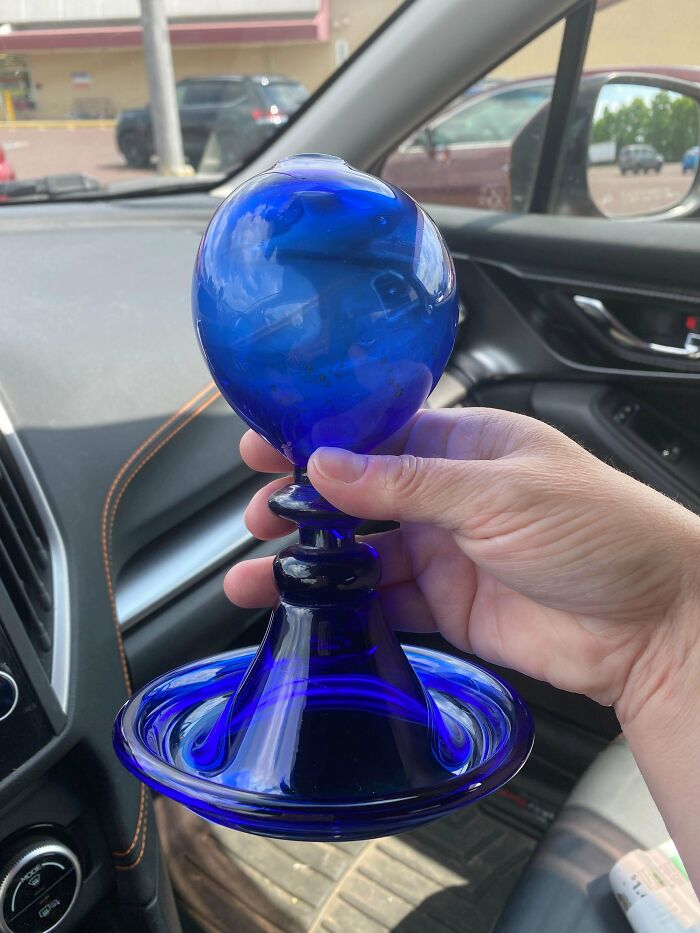
The blue glass thing might not look like much, but the intricate details and unique hue suggest that it might be more than meets the eye. And indeed, after a bit of research, the OP learned that it’s actually a rare and valuable hand-blown whale oil lamp.
Unique Chamber Pot
Ah, the joys of antiquing. You never know what kind of treasures you might find, or in this case, what kind of unexpected surprises might be lurking among the bric-a-brac. This item, for example, could easily be mistaken for a tiny spittoon.
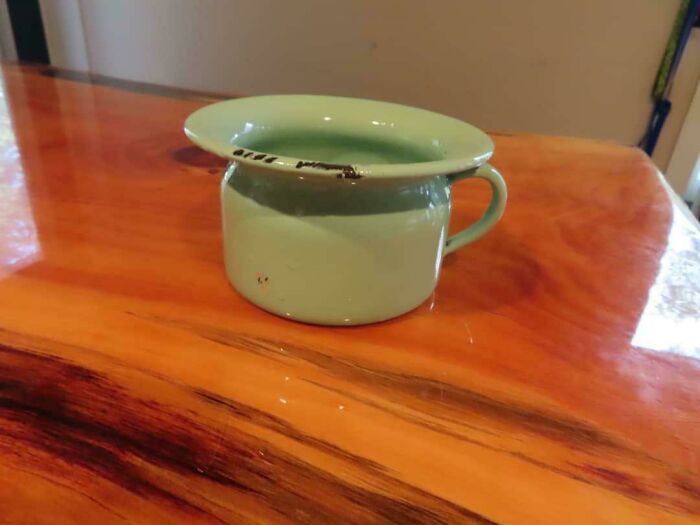
After all, it’s about 6 inches across and has a hole in the top that’s roughly 3.5 inches in diameter. However, this wasn’t meant to hold spit. It was a child’s potty! We’re glad indoor plumbing and diapers are now a thing.
A Jenny Havier
Oh, what devilish delights lurk in attics! It’s a treasure trove of unexpected finds that can give you a glimpse into the mysterious past. And for one lucky soul, their attic held an intriguing red leather devil figure tucked away in a wooden box. But what could it be?
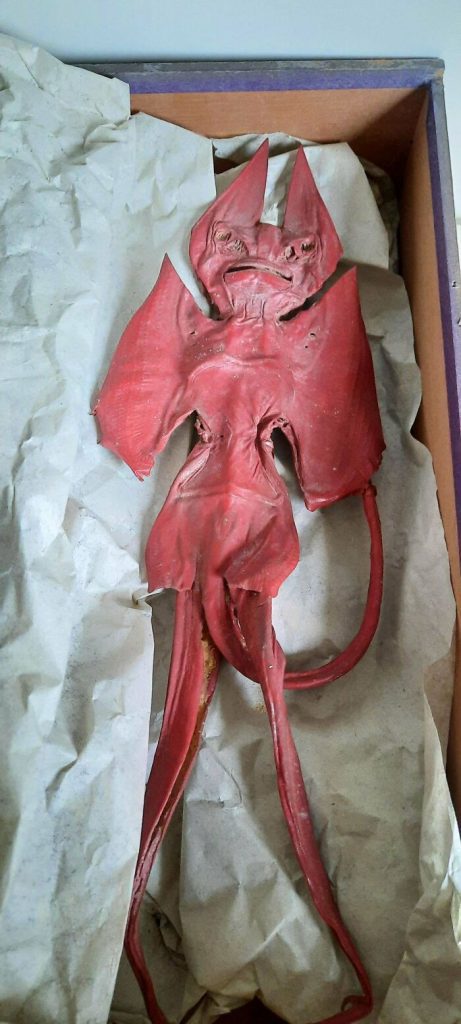
The devilish little figurine, surprisingly, isn’t a relic from some Satanic cult. No, it’s even weirder than that—it’s a Jenny Haniver! A Jenny Haniver is a dried skate or ray that’s been modified to look like a monstrous creature. Though, some people believed they were real-life demons.
A Hindu Ritual Box
Gardening can be a rewarding hobby. There’s nothing quite like watching your flowers bloom, or your veggies sprout. If you live in an old house, you might just dig up a piece of history. One lucky gardener recently discovered a mysterious metallic object that seemed to close in on itself.
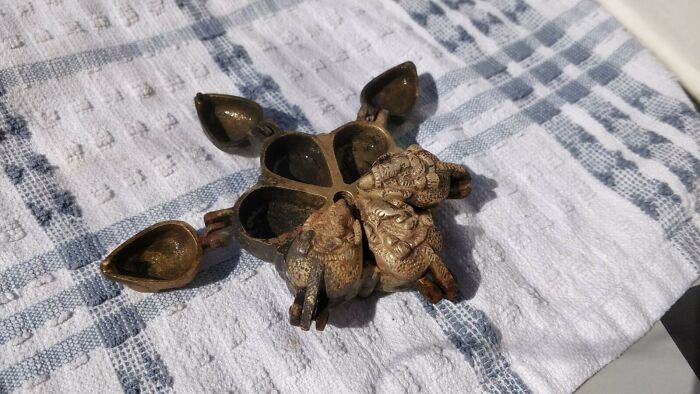
Apparently, they dug up a Hindu ritual box. It was used in ceremonies and religious observances. With its ornate design and intricate details, it’s clear that this box was meant for something special. But there was one problem—it was missing the middle piece that would normally sit in the central hole.
Newspaper Roller
Picture it: a cold, winter’s night, a crackling fire in the hearth, and you’re ready to snuggle up with a good book. But wait, what’s this? You’re out of firewood? Fear not, friend, for we have just the thing for you—a handy-dandy contraption for rolling newspapers into a cozy fire log!
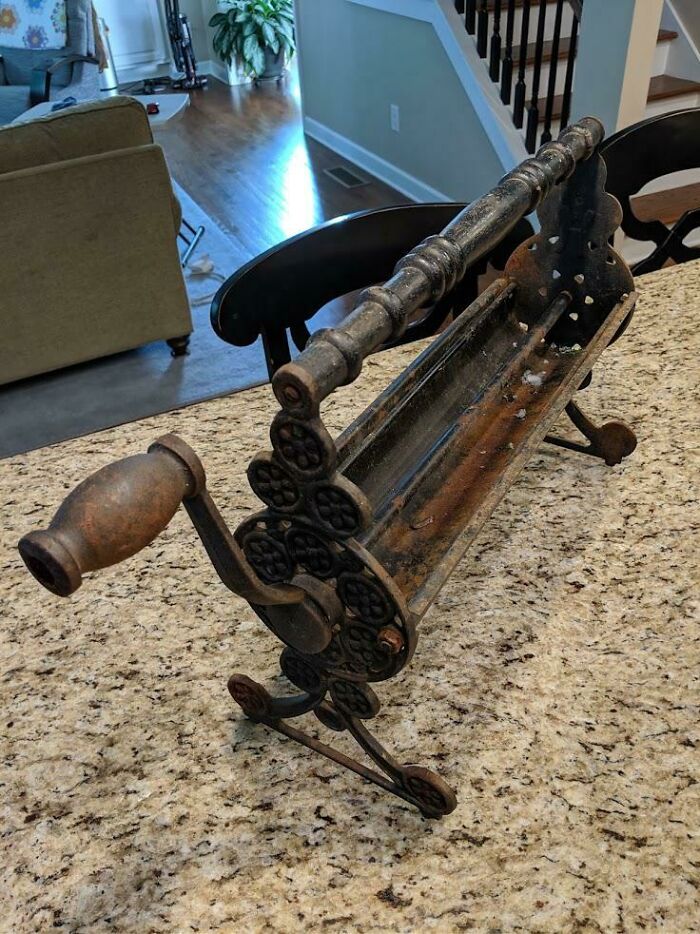
This 17-inch by 5.5-inch contraption might look like a torture device from the Middle Ages, but it’s actually a vintage newspaper roller for all your cozy fireplace needs. Found at an antique festival near Atlanta, this baby will save you from having to venture out into the cold for more firewood.
Souvenir Intaglio
Well, well, look what Grandpa dug up in his garden! This little beauty isn’t a Roman artifact; it’s a souvenir intaglio. Victorian folks collected these on their European Grand Tours. And let us tell you, they were all the rage back then!
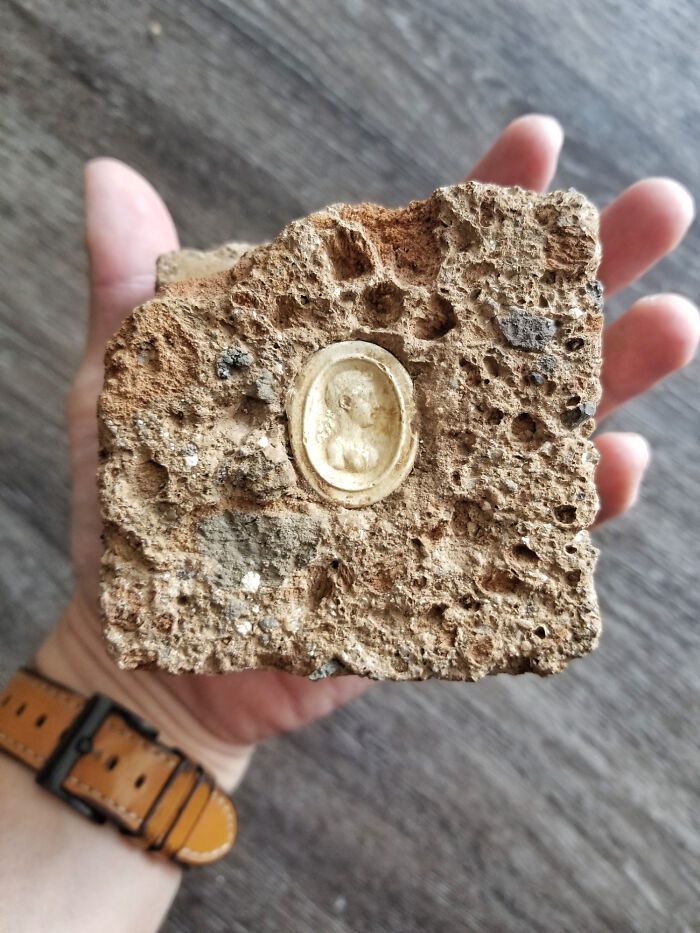
These intaglios were the equivalent of today’s keychains or fridge magnets but with a touch of class and sophistication. Usually kept in a set and framed, they were a way for well-to-do travelers to show off their cultural knowledge and experiences.
Theca
Oh, the mysteries of a metal and glass locket with strange writing on it! It’s enough to pique anyone’s curiosity. But hold onto your hats, folks, because this isn’t just any old trinket. Apparently, this little locket is called a “theca.”
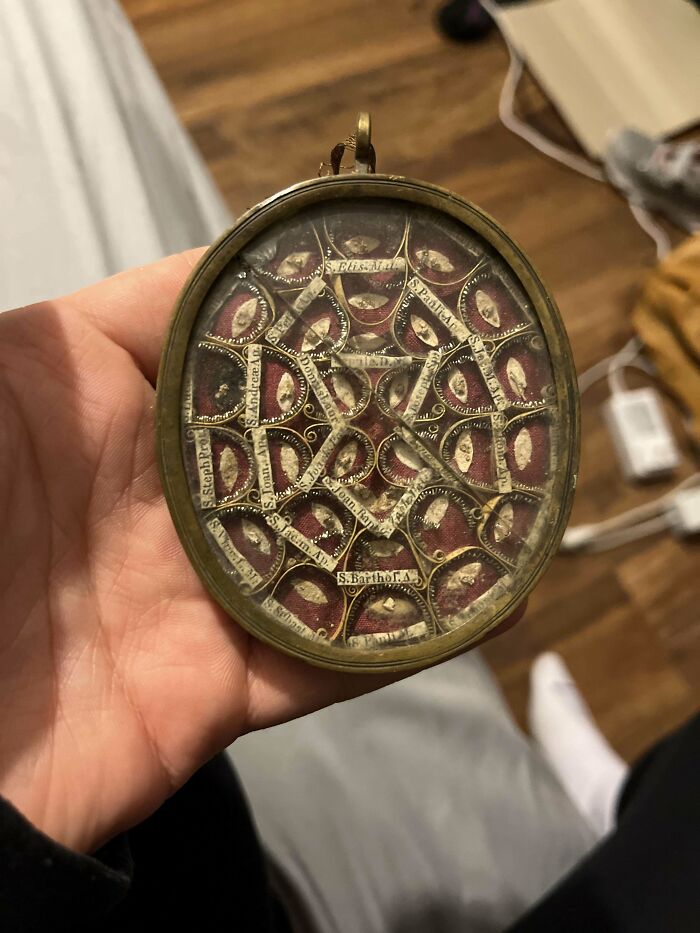
This not-so-ordinary piece of jewelry is a container that holds relics from saints. And it gets better. If the owner can confirm its authenticity, this could be worth a pretty penny. Collectors and history buffs alike would shell out a lot of money to get ahold of this.
Razor Hone
Oh boy, the thrill of discovering a mysterious object in an old, crumbled house! It’s like being Indiana Jones without all the danger and fedoras. And the finds are safer, too. This device is a razor hone from a company called “Rally.”
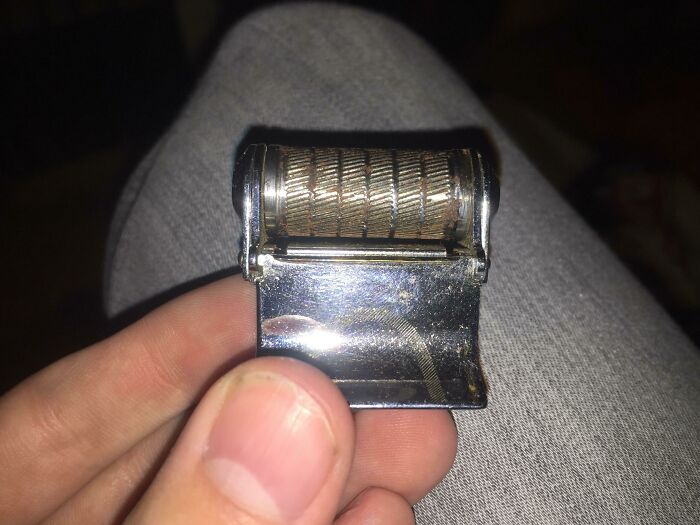
Essentially, it’s a tool for sharpening single-edge razor blades. Back in the day, people would use these razors to shave, but they would eventually become dull and need to be sharpened. But a hone would resharpen your razor blade and get a nice, clean shave again.
Smallsword Guard
This mysterious metal object with raised decorative images was found in the woods near the Chesapeake Bay. Could it be a lost treasure from the shipyard of olden times? Could it be a magical relic left by the long-gone inhabitants of the land?
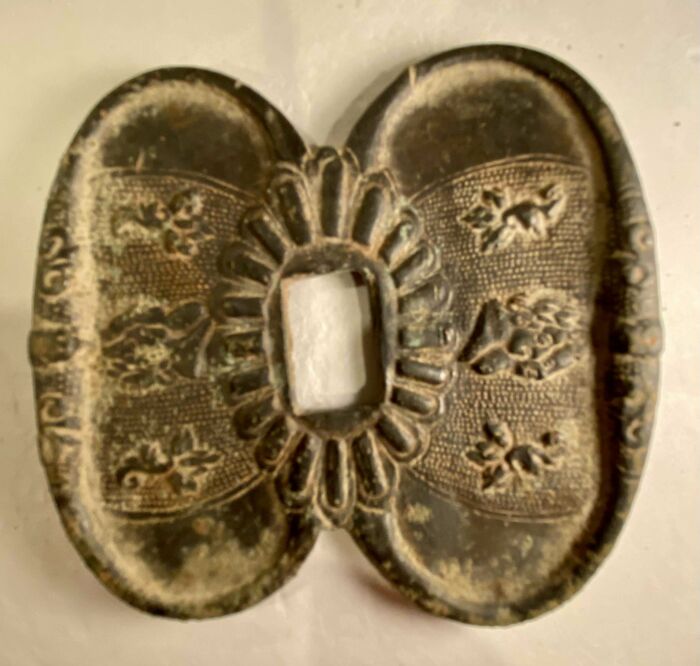
Nope, sorry to disappoint; it’s just a smallsword guard! Bet you weren’t expecting that, were you? But don’t be too disappointed because smallswords are pretty cool, too. They were a popular weapon in the 18th and early 19th centuries, known for their slender, straight blades and delicate hilts.
Interesting Tool
This adventurous yard sale shopper was left scratching their head upon finding this peculiar thumb protector. What could it possibly be for? Protecting thumbs during thumb wrestling tournaments? Shielding thumbs from being slashed by random flailing swords? Is it a really ineffective thimble?
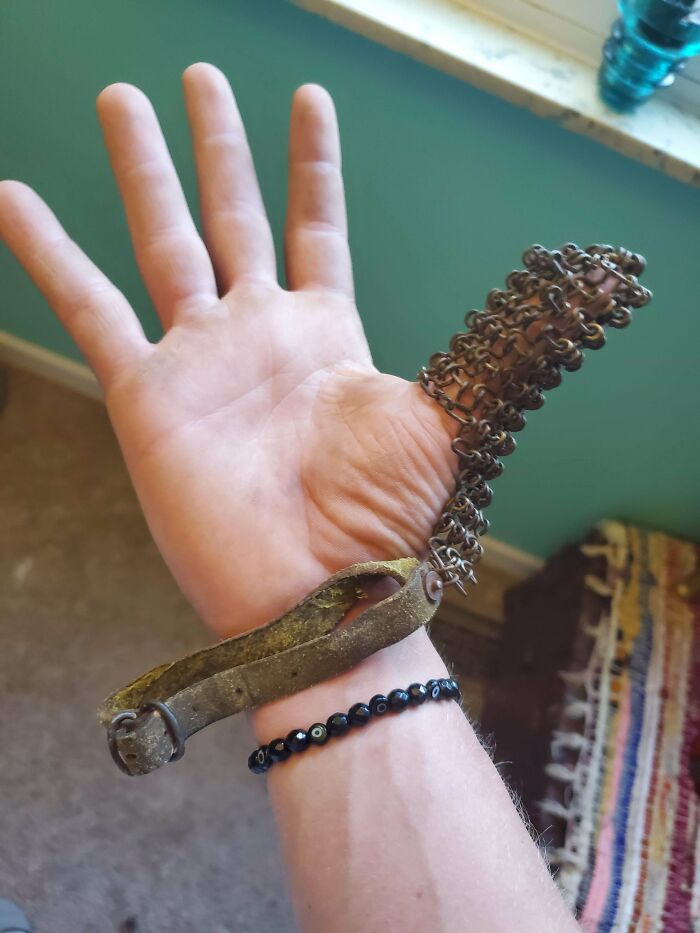
This peculiar thumb protector was actually a tool used for shucking clams and oysters! It’s designed to protect your thumb from sharp edges and knife slips while you’re prying open those delicious seafood treats. Who would have thought that a simple thumb protector could be so versatile?
Betel Nut And Lime Holder
One user stumbled upon a silver treasure chest, only to find it wasn’t filled with gold doubloons, but instead held a bizarre-looking device. At first glance, the device looked like it was made of pure silver, so heavy it could make Blackbeard’s cutlass feel like a twig.
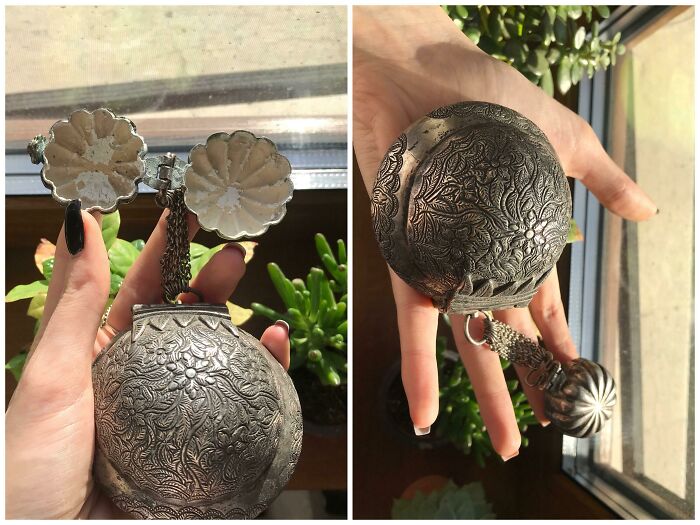
And inside was an old mysterious residue. After consulting with fellow buccaneers and even seeking out the advice of a wise old sea captain, it was finally revealed that this device was a Betel nut and lime holder worn on a belt.
Boot Button Hook
Oh my, what do we have here? It’s a gorgeous silver hook with an Art Nouveau flair. Where do you think it came from? We would’ve guessed a vintage jewelry box or kitchen drawer. But, apparently, this isn’t some bizarre utensil or hairpiece.
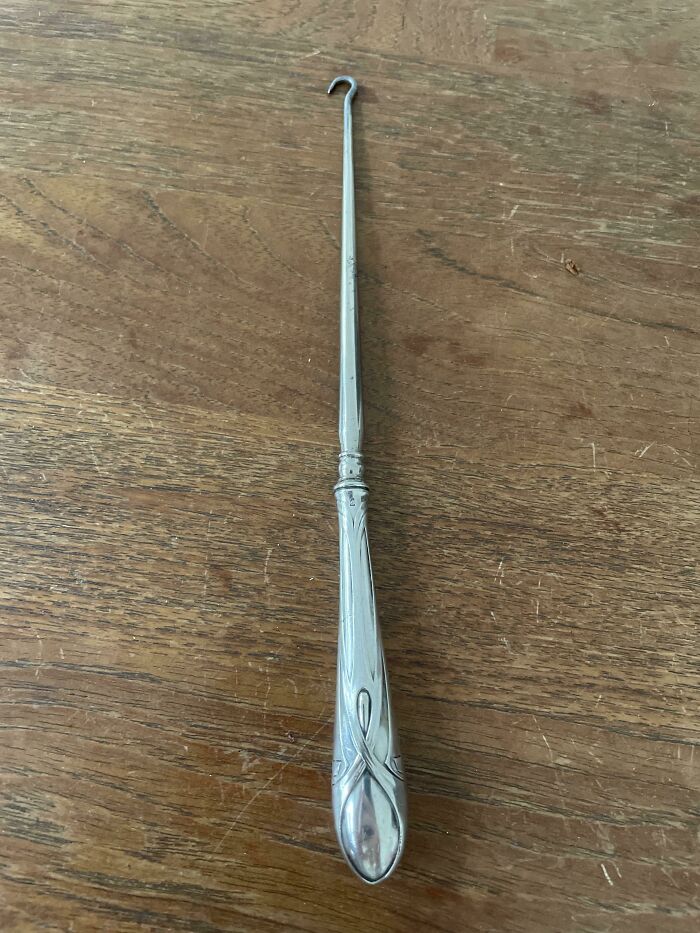
It’s actually a boot button hook! Yes, back in the day when ladies wore boots with tiny buttons all the way up the sides, they needed a little tool to help them fasten those pesky buttons. And that’s where this silver beauty comes in.
Hairpin
This mysterious artifact was passed down from generation to generation, all the way from Persia, and it’s believed to be around 2,000 years old! If only this little trinket could talk, we bet it would have some juicy stories to share.
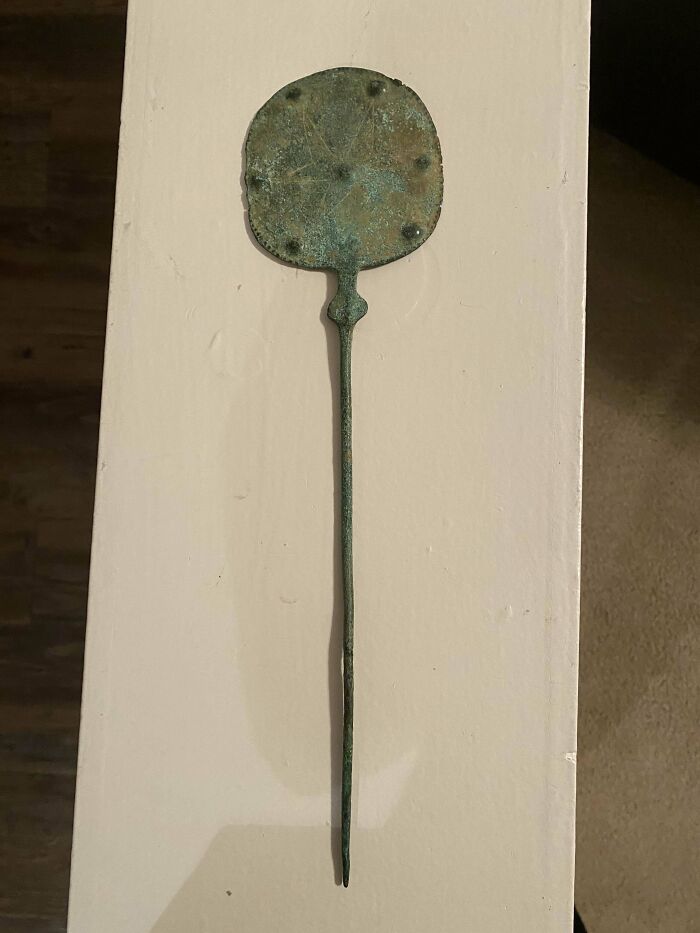
It turns out that this little beauty is actually a hairpin or clothespin/brooch. Oh, the fashion trends it has seen, the hairstyles it has held in place, the fabrics it has adorned. We hope the owner wears this with pride.
When In A Victorian House
Victorian houses are known for their beauty, elegance, and hidden secrets. Such was the case for one homeowner who discovered a peculiar item hidden in the walls of their Victorian house. Though the label is a bit worn, it seems to be a bottle of medicine.
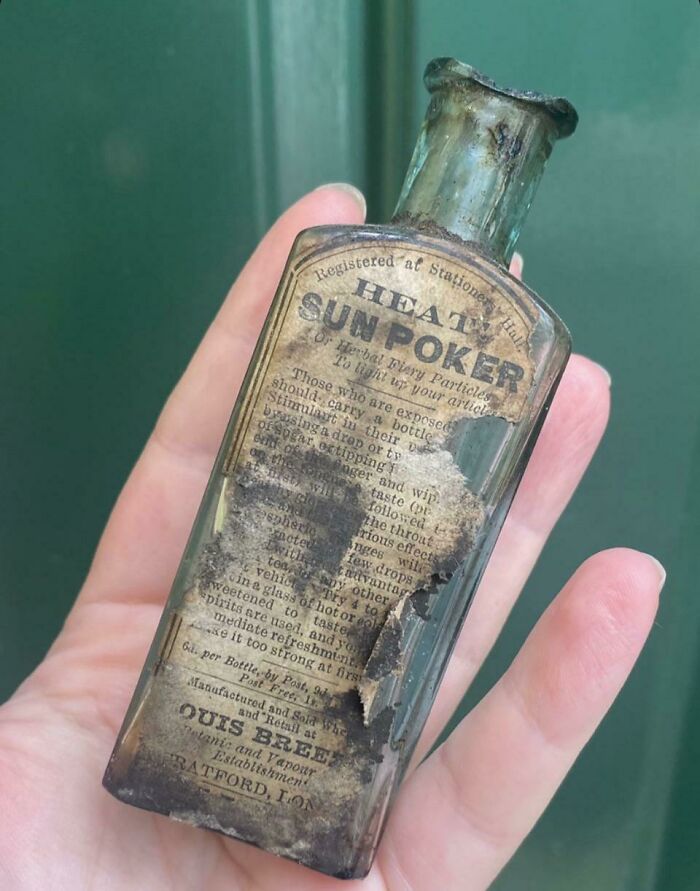
However, upon further inspection and research, it was revealed to be a prime example of Victorian quackery. During the Victorian era, there was a proliferation of questionable medical practices and products being marketed to the public. From snake oil to electrical shock machines, people were willing to try just about anything to cure their ailments.
Hub Cap
For centuries, horse-drawn carriages ruled the road… and even before there were roads. The wheels, though primitive by today’s standards, required hub caps to protect the hub and axle. Hub caps were often made of metal and featured intricate designs to show off the owner’s wealth and status.
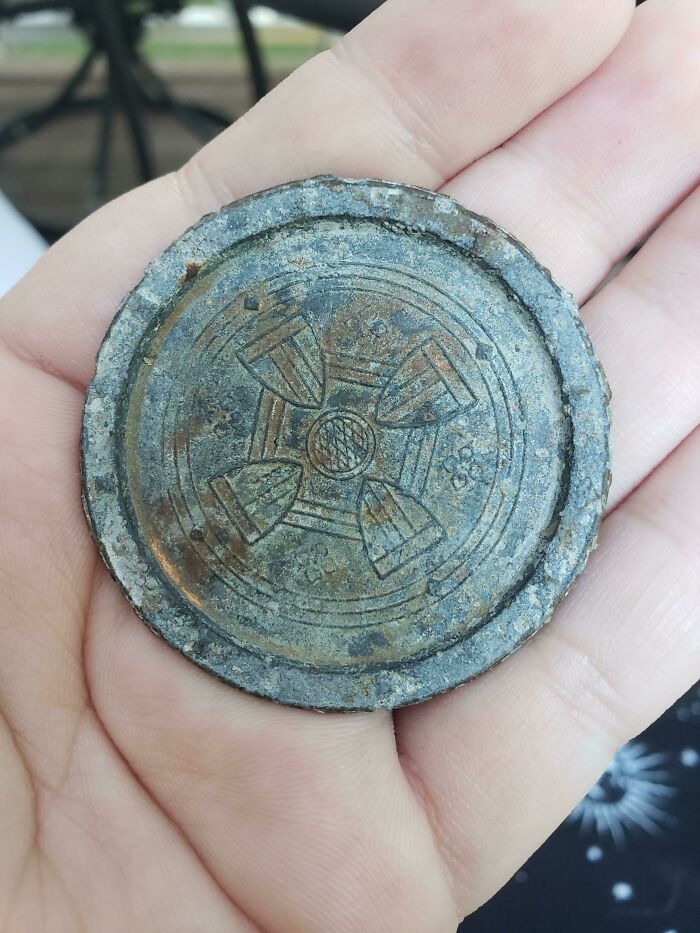
This particular hub cap appears to be quite ornate, with detailed designs pressed into the metal. It’s fascinating to think that this hub cap may have belonged to a wealthy family who used it to adorn their carriage as they traveled through the countryside.
Carpet Stretcher
Oh, the mystery of antiques! They can be intriguing, fascinating, and downright puzzling at times. But fear not, dear antique enthusiasts, for even the most mysterious of objects can be identified with a little bit of detective work. Take, for instance, this object that has stumped antique dealers for years. What could it be?
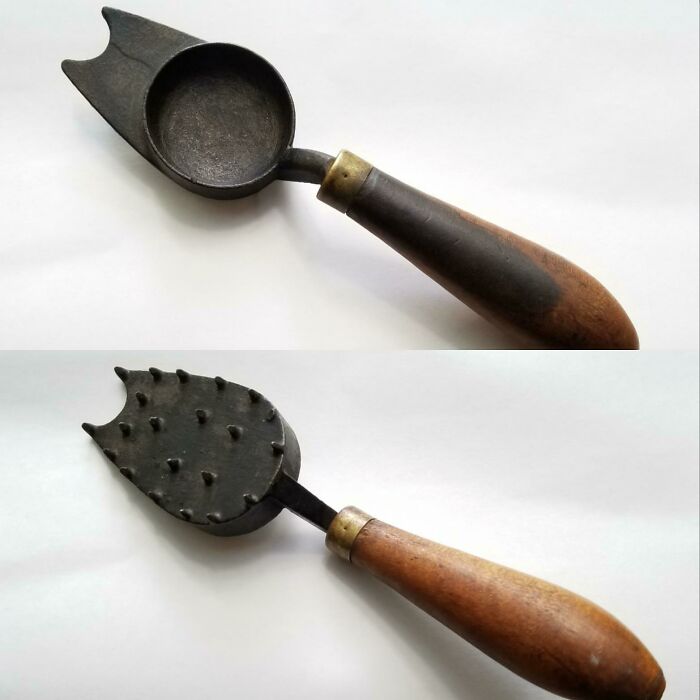
It turns out that this object is simply a carpet stretcher. While it may not be the most exciting discovery, it just goes to show that not every bizarre find is unidentifiable. So next time you come across an object that leaves you scratching your head, don’t despair.
Charms
It’s always exciting to discover something special among family heirlooms. These charms may have been your grandmother’s cherished possession, representing important values and ideals to her. The snowflake box with a spring clasp adds a whimsical touch, almost like a secret treasure chest.
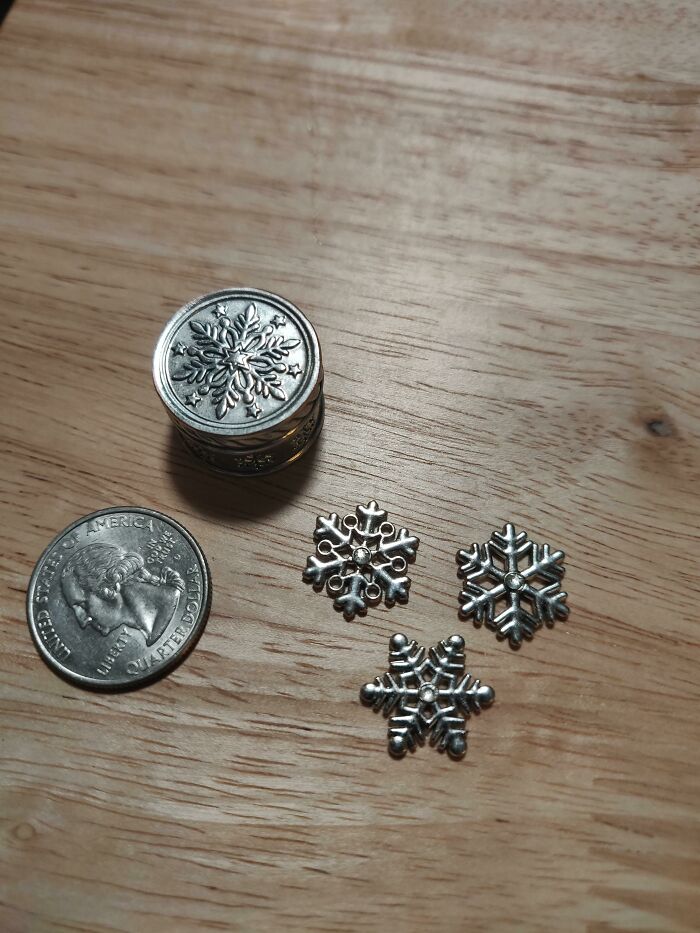
First of all, let’s talk about the fact that these snowflakes go into a box. How cute is that? It’s like a little winter wonderland there. These snowflakes aren’t just any old snowflakes. No, no, these are charms. And more than that. These are peace, love, and happiness charms.
Wax Catcher
A mysterious little object hanging on a nail, hiding behind a picture frame. It’s got a hole in the middle the size of a quarter. What could it possibly be for? Get ready to be enlightened, friend, because it turns out this little gem is a candle wax catcher!
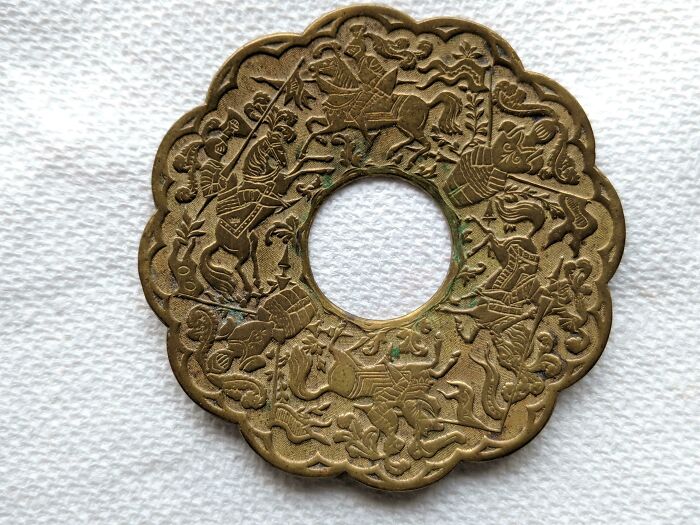
No more pesky wax drips ruining your beautiful candle holders. Simply slip your candle through the hole and voila, your wax stays in the catcher. Now, we know what you’re thinking. “But why hide it behind a picture frame?” Perhaps their ancestors were trying to keep their candle tricks a secret from prying eyes.
Vintage Umbilical Cord Cutting Scissors
It’s a tale as old as time—a person stumbles upon a mysterious object at a flea market and decides to take a chance on it. For one user, that object was a pair of scissor-like devices that they bought years ago without a second thought.
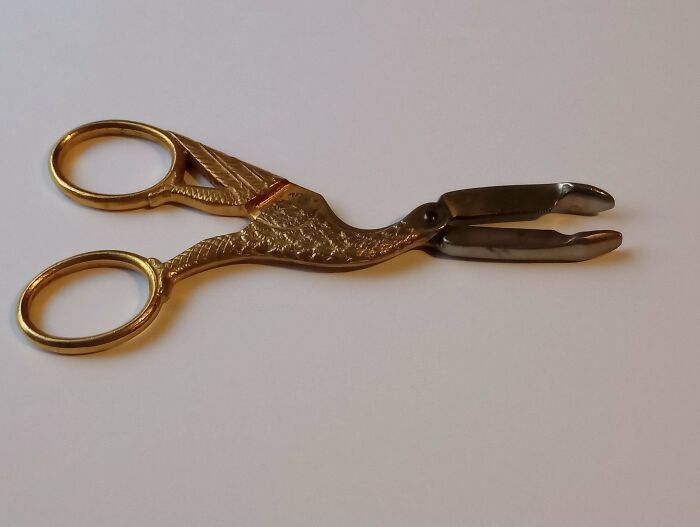
But little did they know, they had unwittingly purchased a vintage umbilical clamp shaped like a stork. Yes, a stork. The same bird that’s synonymous with delivering babies. It turns out that in the olden days, stork-shaped umbilical clamps were all the rage.
Planter’s Chair
Looks like a chair with some serious arm action going on. What’s the deal with those extended arms? Surely having such long limbs as never the norm. Turns out, friend, that this ain’t just any old chair. No, no, no. This is a plantation or planters chair.
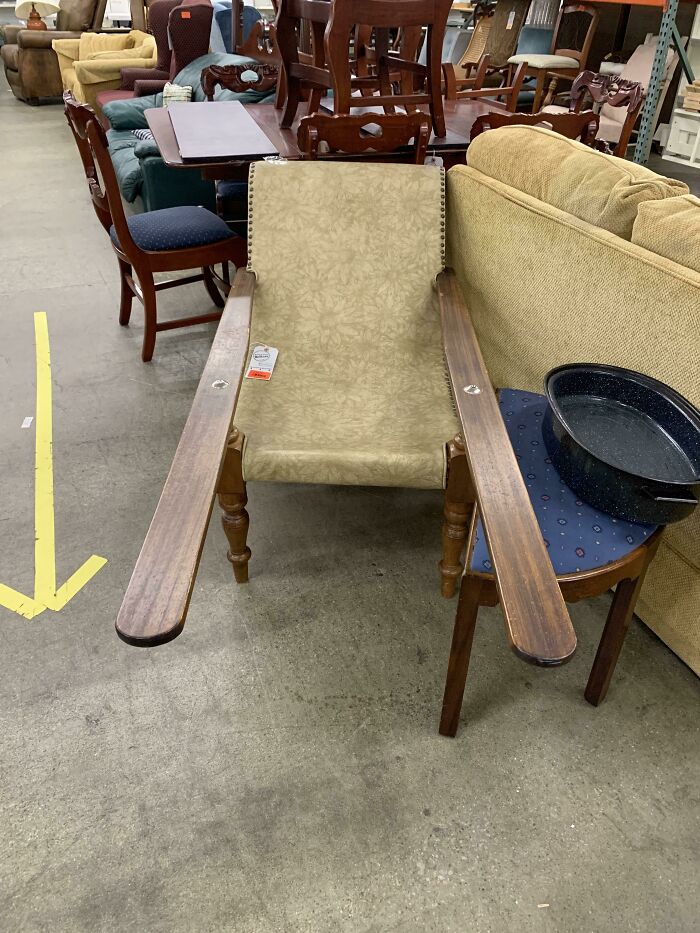
It was designed for those who needed some TLC after a long day of horse riding. You know, like when your legs are all swollen and sore and you just want to put your feet up and relax. Except in this case, you’d put your legs up on the chair’s arms.
Dolly Tub
At first, we thought this was an odd hairpin, but in fact, it’s a dolly tub for washing clothes. And no, it’s not a dolly as in a cute little toy that kids play with—it’s a dolly as in a large wooden container used for washing clothes back in the day.
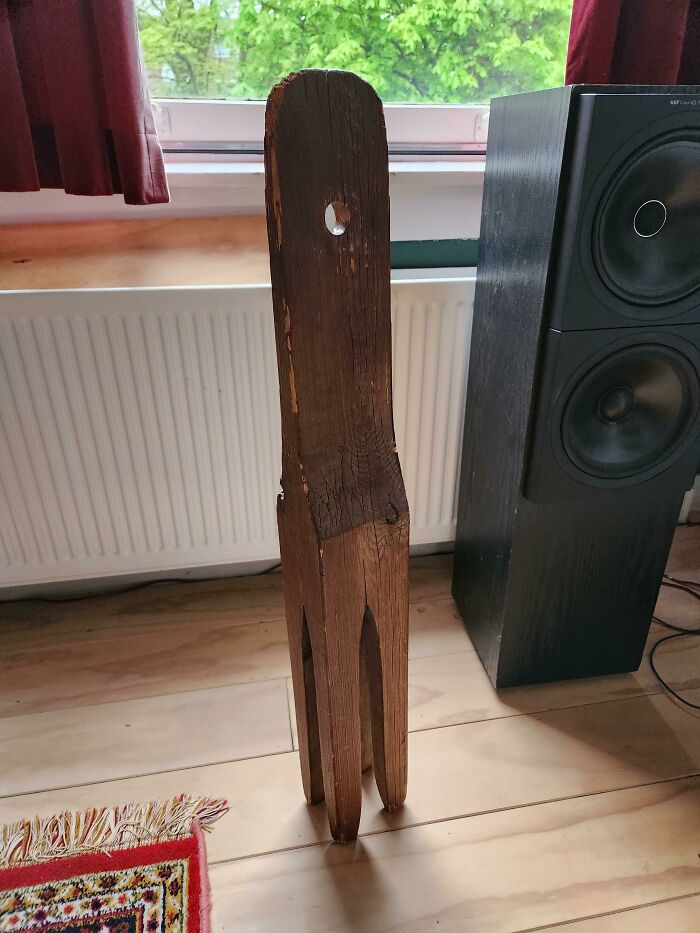
Dolly tubs were an efficient way to wash clothes before the advent of our beloved washing machines. The tub was filled with water and laundry soap, and then clothes were placed inside. A wooden “dolly” (basically a long stick with a handle) was used to agitate the clothes and get them clean.
Clockwork Spit Turner
A mysterious contraption hanging outside of your fireplace, eh? Looks like it’s got gears inside of it and pivots into the fireplace. What tarnation could it be? it’s a clockwork spit-turner! That’s right, no need to use your own muscles to turn that roast or other delicious meat you’ve got cooking in the fireplace.
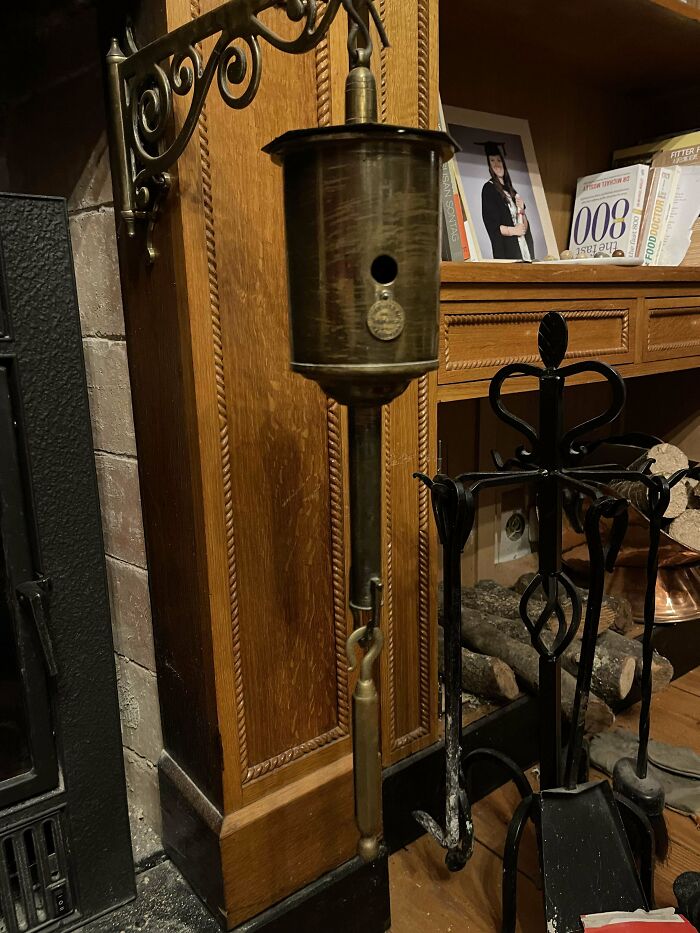
Imagine being able to sit back and relax with a glass of wine while your dinner slowly rotates and cooks to perfection. No more sore arms from manually turning that spit. And let’s be honest, who has the time or energy for that anyway?
Paan Daan
This mysterious container that was gifted to our dear friend turns out to be a paan daan. For those unfamiliar with the term, a paan is a betel leaf stuffed with a variety of ingredients such as spices, sweets, and even tobacco, which is commonly consumed in some parts of Asia.
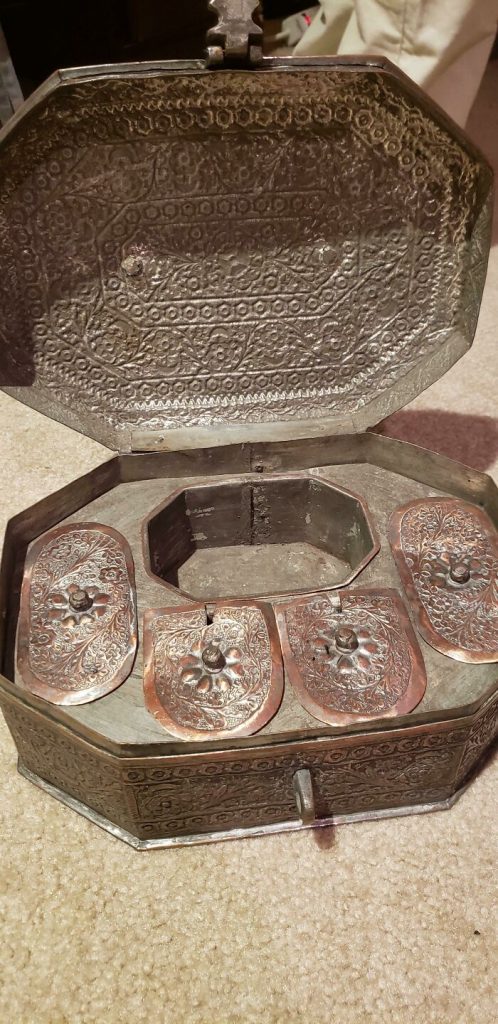
While they initially thought it was a simple tea or spice holder, they were pleasantly surprised to learn about the cultural significance and unique purpose of their new paan daan. Who knows, maybe they’ll even try their hand at making their own paan and impress their friends with their newfound knowledge and fancy container.
Antique Purse
This “locket” had everyone scratching their heads, but it turns out that looks can be deceiving. After a bit of sleuthing, it turns out that this silver beauty is actually a purse! Now, you might be wondering how a locket could possibly be a purse, but hear us out.
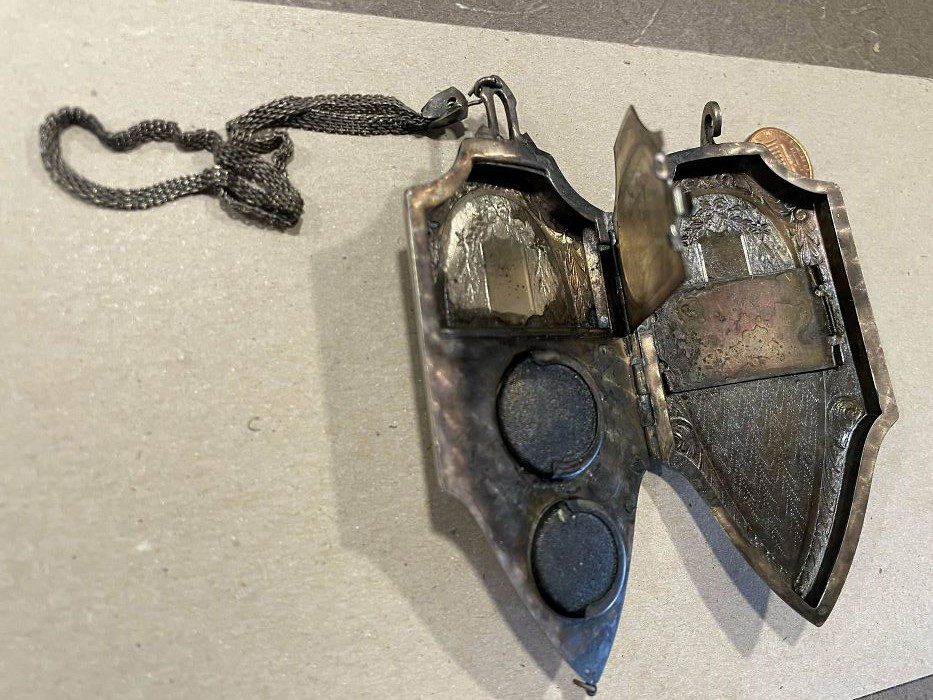
Inside this “locket,” there’s enough space to store a few coins for bus or cab fare, some powder makeup (behind the little door), and even calling cards. It’s the perfect size to slip into a pocket or a small purse, and it’s certainly much fancier than any modern-day coin purse.
Ghost Town Recoveries
Recently, two mysterious objects were uncovered at the Gwalia Ghost Town Museum near the outback West Australian mining town of Leonora. One was an ornate cast iron case with a hole and a turnkey, while the other was a leather and metal box with a handle, button, and a transparent panel.
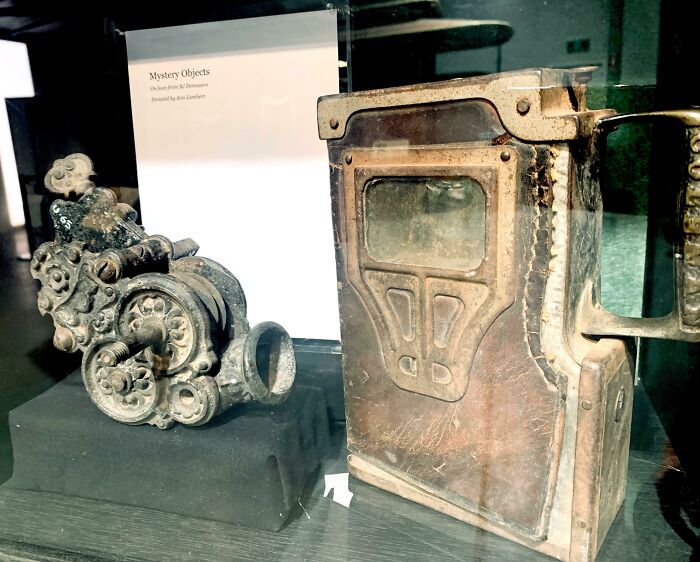
We don’t know about the right object, but the one on the left is a cast iron air compressor or pump. It was likely used in mining operations to power tools and machinery. Its ornate design may have served as a way for the owner to brag about their wealth and status.
Buckle/Hardware For A Leather Harness
Attention all fashionistas! A stunning piece of hardware has been unearthed that is sure to make a statement in any outfit. This buckle/hardware for a leather harness was discovered 32cm under the surface in a horse-plowed field in Norway, proving that great fashion truly stands the test of time.
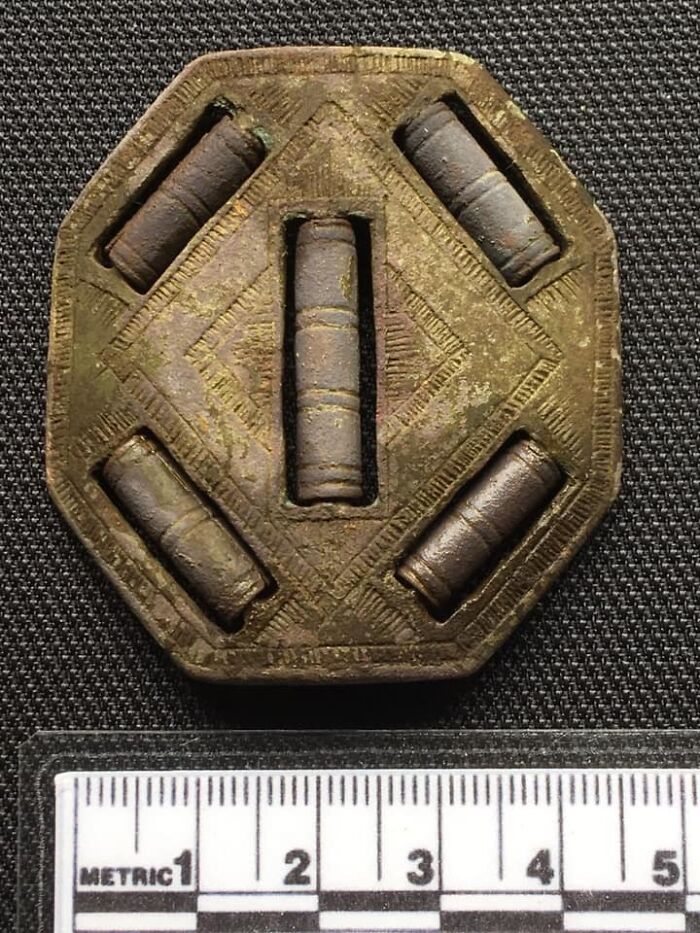
Crafted from copper/bronze, this buckle features two diagonal straps and one horizontal strap, making it the perfect accessory for any edgy and bold outfit. While showy belt buckles are more often associated with the southern US, a wearable piece of history will always be in style.
Ancient Bronze Pot
A curious individual has stumbled upon an ancient bronze pot with two spouts that look like a hanging lavabo but with necks too low to carry water without spilling. What could it possibly be used for? After some digging around and putting on our detective hats, it seems we have cracked the case, dear Watsons.
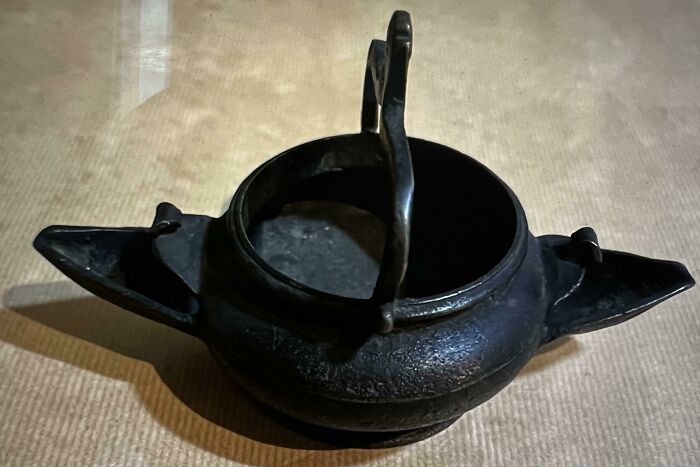
It turns out that this is none other than a Betty Lamp! These lamps burned whale oil and were commonly used in the 18th and 19th centuries. The wick would reach out of the two spouts, and the lamp would be hung on a hook or nail to provide light.
Can Opener
When you think of the key weapons of war, what comes to mind? Guns? Swords? Well, it’s time to add another item to that list: the humble can opener. During the Civil War and World War I, soldiers relied on a specific type of can opener known as the “Bully Beef” can opener.
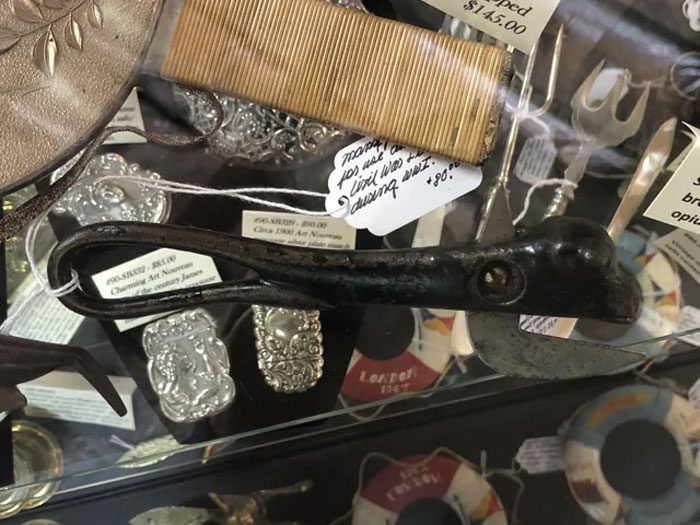
Why the odd name, you ask? Well, it was designed to open cans of pickled beef, which was a staple of soldiers’ rations at the time. And let’s be honest, “Bully Beef” just sounds more fun than “pickled beef,” doesn’t it?
Prayer Necklace
A mysterious little trinket with a secret inside. Looks like a pendant of some sort, but why the need for it to open up? Let’s take a closer look. Ah, it seems we have a tiny piece of paper nestled inside. Is it a treasure map? A secret code? A love note, perhaps?
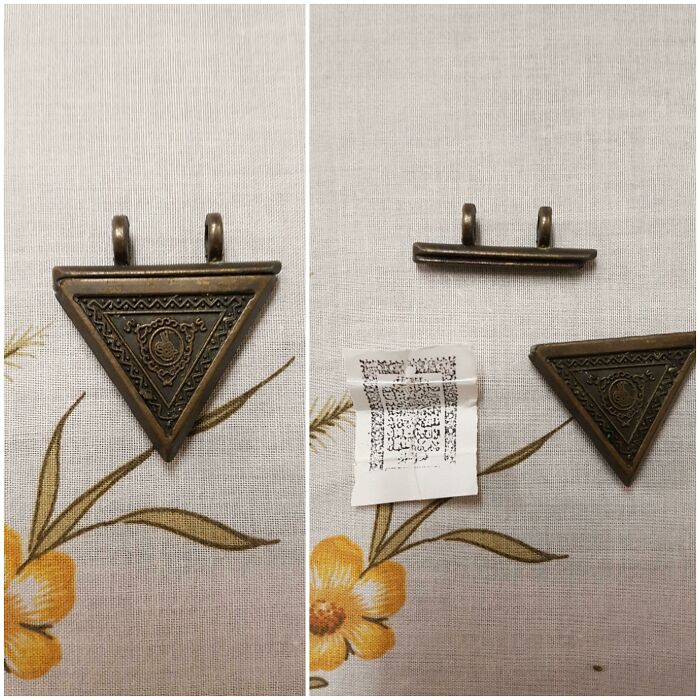
No, no, it’s a prayer! How quaint. This pendant is actually a prayer necklace. That’s right, you can write down your deepest desires, fears, and hopes on a tiny piece of paper and carry it with you wherever you go.
Roast or Ham Holder
Are you tired of holding your roast or ham with your bare hands like a savage? Are you ready to upgrade your carnivorous habits in a sophisticated and civilized way? Well, have no fear because we have found the solution to all your problems—a roast or ham holder that mounts to a cutting board!
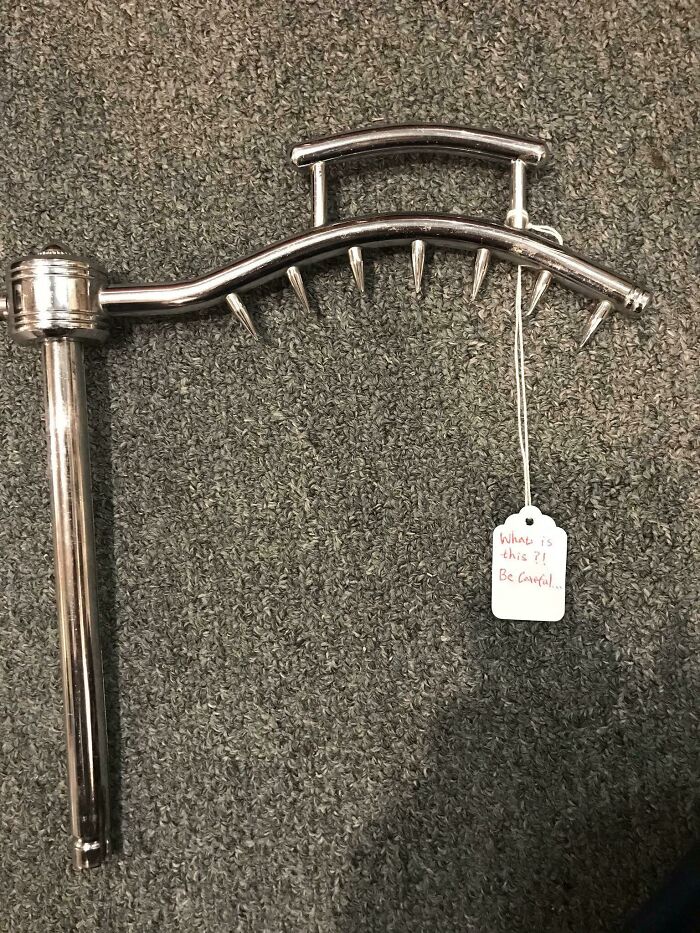
Though it looks like a medieval weapon or some sort of torture device, it’s actually a roast or ham holder. The spikes are designed to hold your delicious meat securely in place while you carve away with your trusty knife. Plus, it can be mounted to a cutting board for even more stability.
Royal Navy cordite
Not every antique find is perplexing, but this person was stumped when they uncovered this beautiful yet mysteriuous container. After some investigation, it turns out that this is not just any ordinary container. In fact, it’s a Royal Navy cordite bucket.
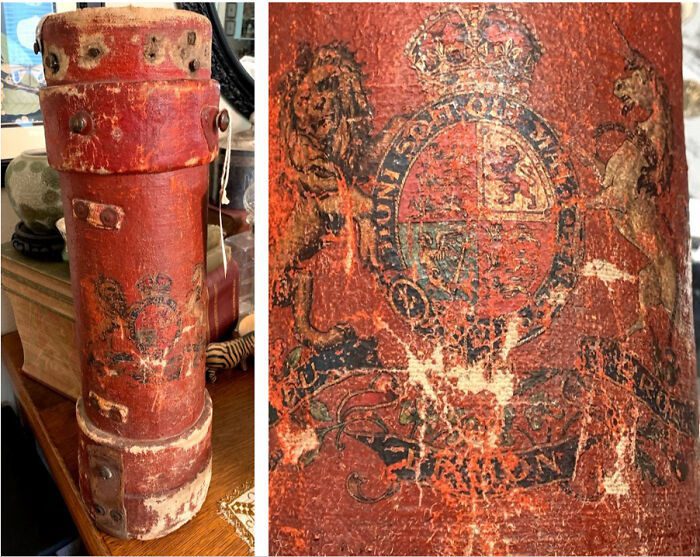
For those who are not familiar, cordite is a type of smokeless gunpowder that was used by the British military in the late 19th and early 20th centuries. And as you can imagine, cordite needs to be stored in a safe and secure manner, which is where the cordite bucket comes into play.
Maryland State Seal
Ahoy there, matey! It looks like we’ve stumbled upon a mysterious artifact from the high seas of history. What could it be? A treasure map? A pirate’s gold doubloon? Nay, it’s something even more intriguing—a Maryland State Seal! What is that, you ask?
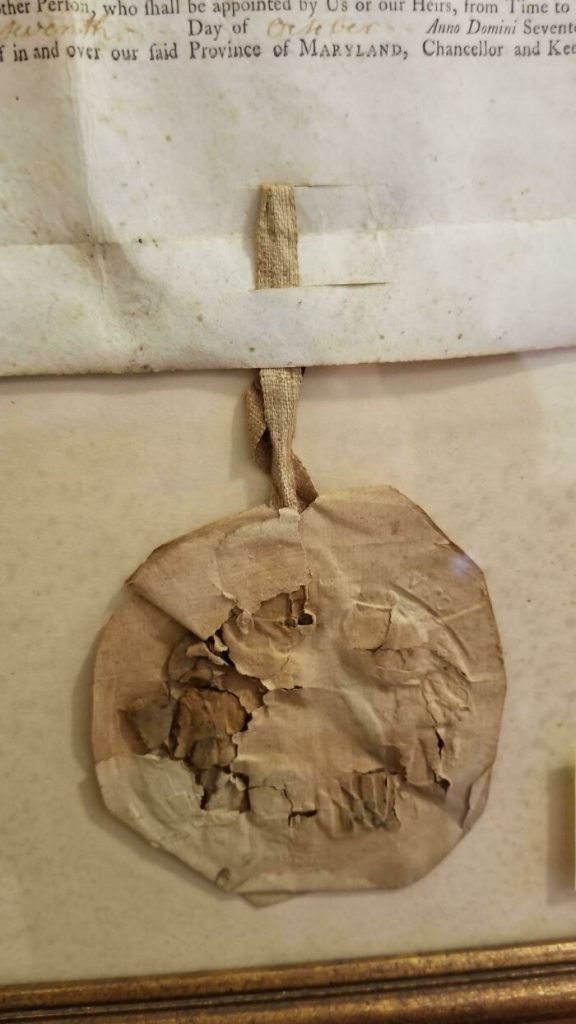
This comes from the 1700s when the good people of Maryland were running a busy little colony. The seal was used to authenticate important documents like property deeds, legal contracts, and, of course, letters of marque for any enterprising privateers looking to ply their trade on the high seas.
Mortar And Pestle
This mysterious object was found in a German home built shortly before World War II. Some speculated it was a secret Nazi weapon or a hidden stash of treasure. But after much investigation and analysis, it turns out that the object is none other than a mortar and pestle!
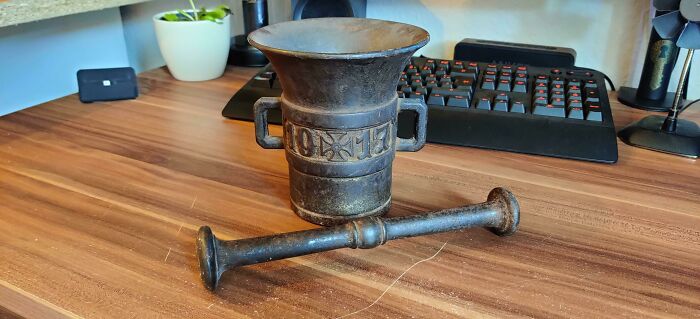
That’s right, folks. After all the hype and excitement, it turns out that this seemingly mysterious object is just a simple kitchen tool. But don’t be too disappointed. Even something as ordinary as this is a piece of history many would be happy to have in their homes.
Glove Stretcher
You might assume this strange, silver-handled clamp with a hollow beak is a vintage or antique umbilical clamp. But one user discovered that this object was actually a glove stretcher. Before the days of elastic and stretchy fabrics, people had to get creative when it came to putting on tight gloves.
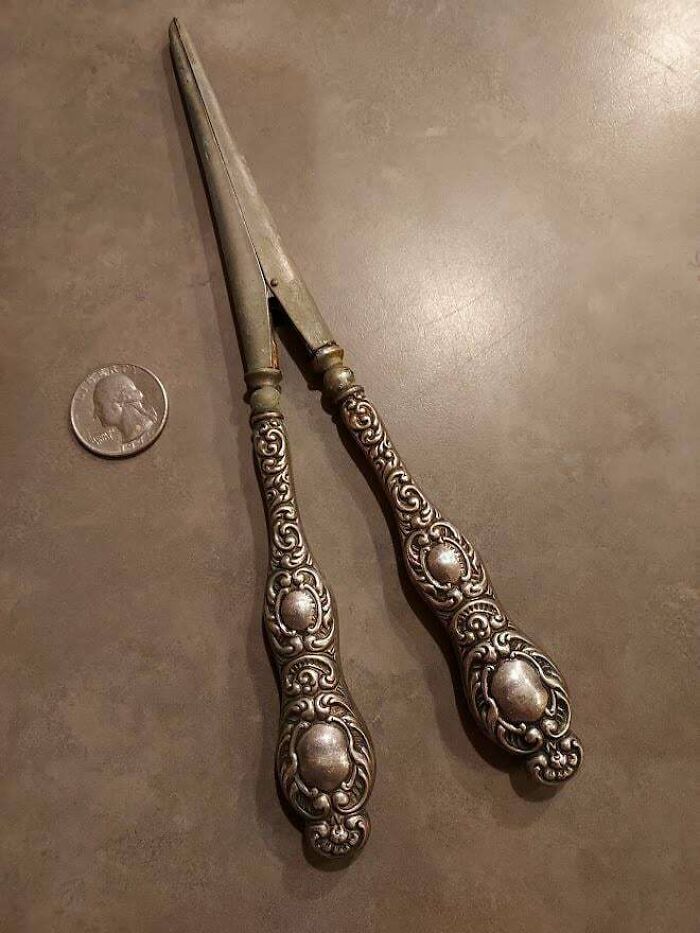
It was a nifty little contraption that would hold onto the fingers of the glove and gently stretch it out, making it easier to slide onto the hand. But let’s be real—if you stumbled upon this object without knowing what it was, you might think it was some kind of medieval torture device.
Fire Extinguisher
What is this intriguing glass bulb filled with liquid and a metal disk floating inside? Before you start using it as a paperweight or a conversation starter, you might want to know that it’s actually a fire extinguisher. Yes, you read that right!
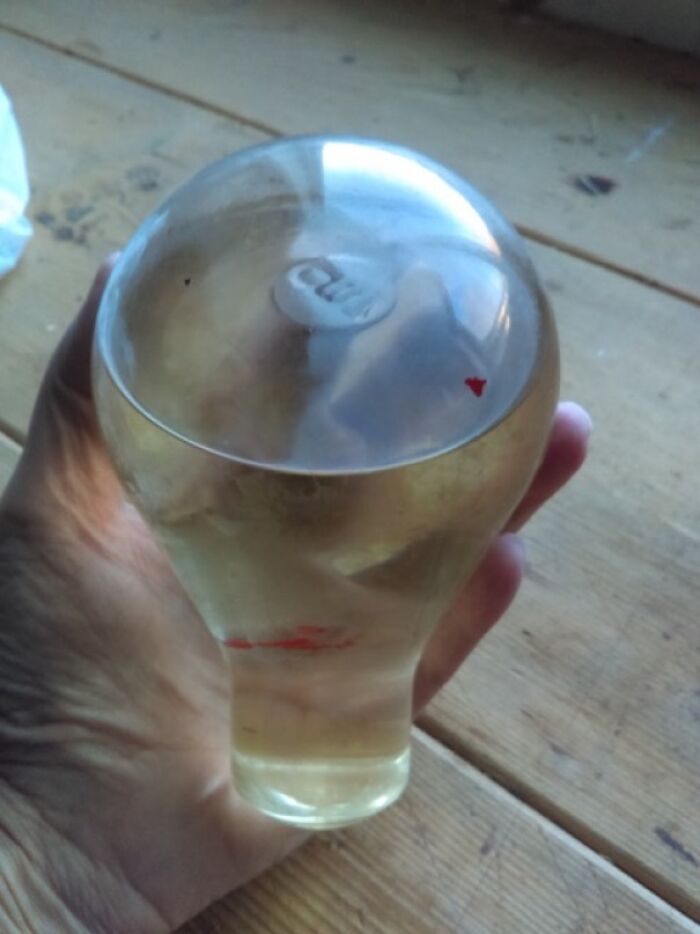
These unique extinguishers were quite popular in the early 1900s and were filled with a chemical called carbon tetrachloride. When a fire broke out, you simply grabbed the bulb, removed the cap, and tossed the entire thing into the flames. The metal disk inside would puncture the glass, releasing the chemical and extinguishing the fire.
Beekeeping Tool
Are you ready to solve another mystery of the antique world? Today, we have a peculiar object that has puzzled the family of a certain individual for years. This mysterious object looks like it was mounted on a wall at some point in time and nobody seems to know what it could be.
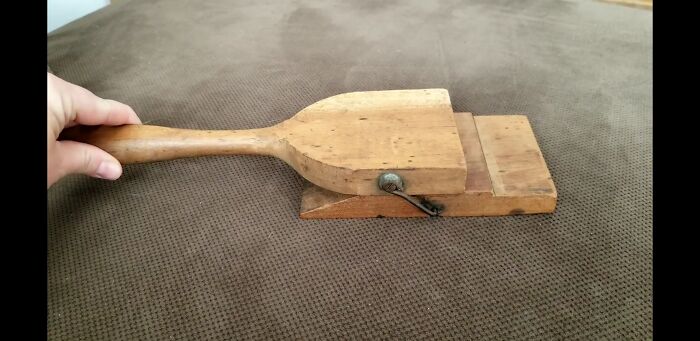
It turns out that this object is actually an antique beekeeping tool known as the Bees Parker’s Foundation Fastener, which dates back to the 1800s. This nifty device was used by beekeepers to quickly and efficiently install sheets of beeswax foundation into the frames of a beehive.
Chalk Line
Ah, the mystery of the round metal object with a lever! What could it possibly be? A time capsule? A secret spy gadget? A miniature UFO? Nope, turns out it’s just a good old-fashioned chalk line. You know, the tool you use to make straight lines on surfaces like wood, metal, or concrete.
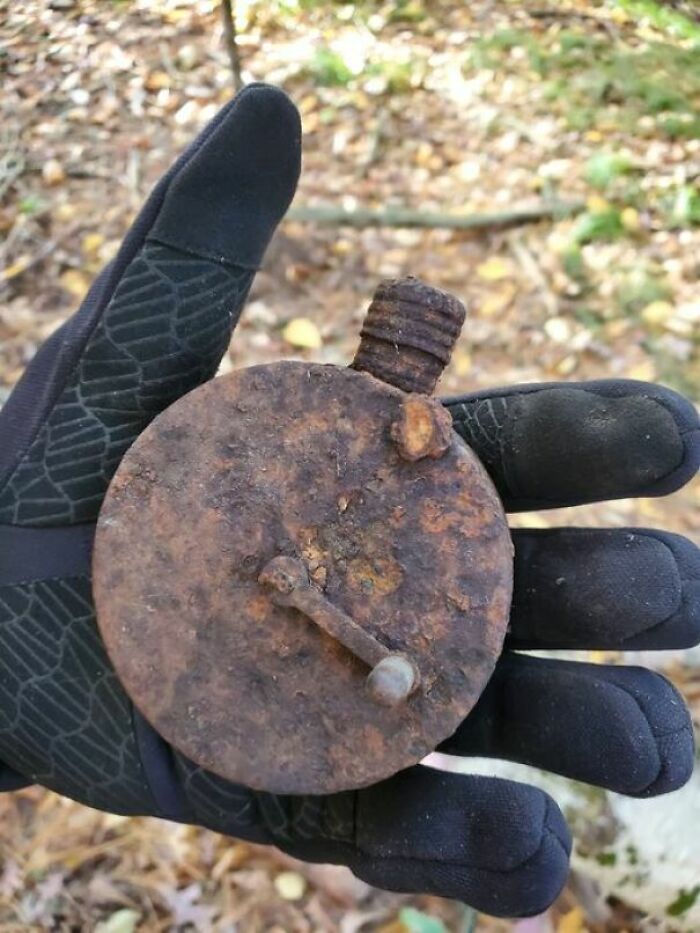
And here we were hoping for something a little more exciting! But hey, at least now you can use it for all your woodworking or home improvement projects. And who knows, maybe it will still hold some secret powers that we haven’t discovered yet. After all, it did keep us guessing for a while there.
Cover Plates
Are you ready for another intriguing mystery to solve? We’ve got just the thing for you! Someone has passed down a pair of cover plates for a book in the UK, but their purpose is a complete mystery. Can you help identify what these are and what they were used for?
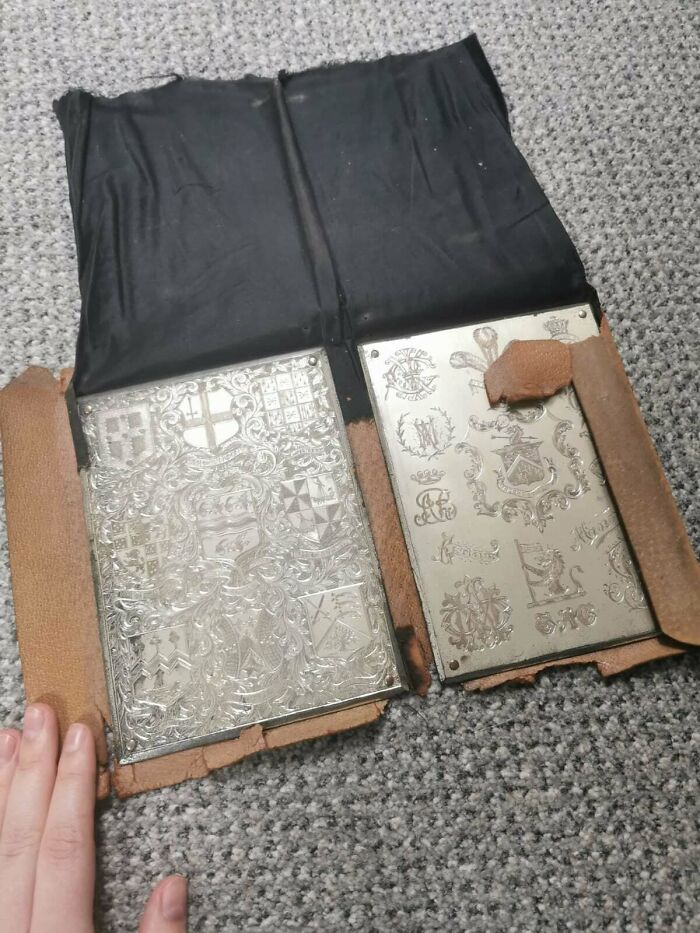
After some research, it turns out that these cover plates were not just any ordinary book covers. They were designed to be riveted over the normal cover of a book, and likely served a special purpose. The engraving on the plates suggests that they may have been used for a book involving royalty or heraldry.
